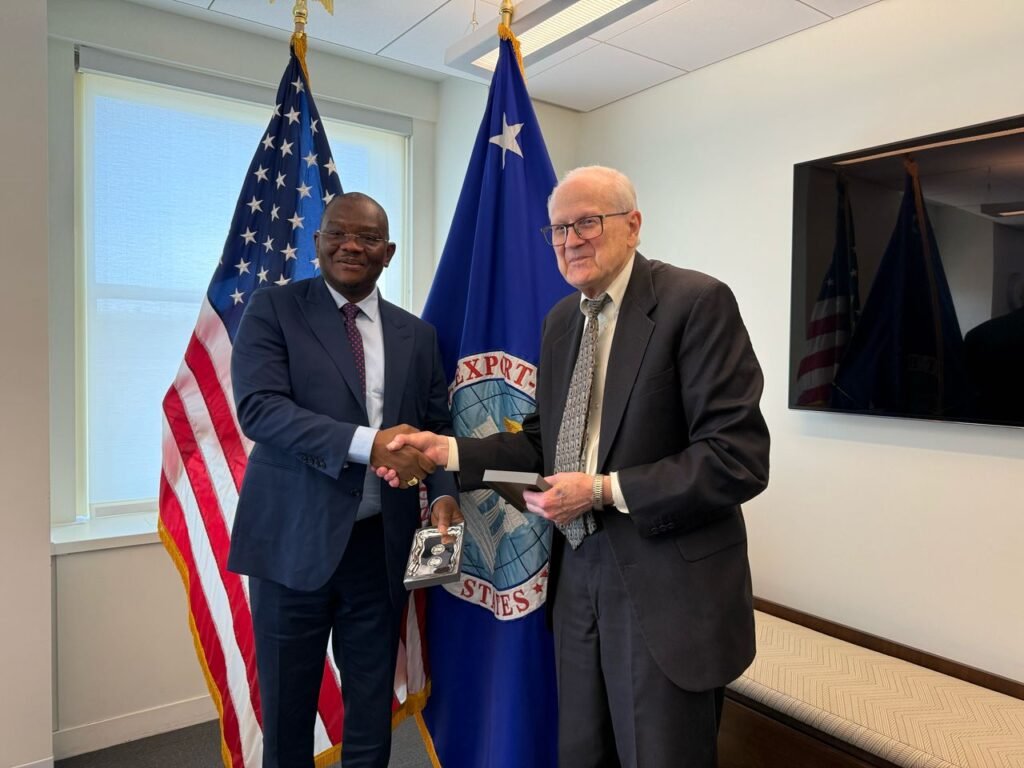Hot!
Alhaji Salamu Amadu, a global icon inspiring Ghanaian youth

Ambassador Amadu on a global platform
Starting business as a teenager is a Herculean task but it was an obstacle Chief Executive Officer (CEO) and Chairman of Afro-Arab Group, Alhaji Salamu Amadu surmount to become one of the most successful business moguls on the continent and beyond.
The 36-year-old’s success story has not only become an inspiration for many Muslim youth within the Nima-Mamprobi areas but an icon revered across the globe.

With over two decades in business, Alhaji Amadu, leads the Afro- Arab Group conglomerate which has over 10 subsidiaries with interest in various sectors including import and export, real estate, travel and tourism, microfinance and sports.
Young Amadu ventured into business at a tender age of 10 with his older brother in what was known as the ‘black market’ business which was handed over to them by their father.

Later after Senior High School (SHS) at Abundant Grace Academy in 2004, he decided to start his own business which birthed the Afro-Arab Group in 2007 as an import and export company for general goods and services.
It was, however not without challenges as the young entrepreneur had to deal with many people who did not give him a chance to break through in the highly competitive market.
However, with determination and consistency, Alhaji Amadu managed to establish the business and currently is one of the most sought after business personalities in Ghana.
According to him, encouraging the youth and elderly in the community and the recognition of his contribution to changing lives makes him a satisfied businessman.

Most important to him was the recognition for his resilience after surviving the turbulence of the financial cleanup exercise in 2019 by President Akufo Addo and former President John Dramani Mahama.
“Coming from the Zongo community to build a brand that the most important people in the country would recognise is a success on its own and has been a major inspiration for me,” he stated.
His immeasurable impact on the lives of the over 100 people employed directly with some provided a landed property during the 10th Anniversary celebration of the company means so much to him.
Indirectly, Alhaji Salamu said, over 1,000 people have benefitted from the company as everything he makes goes back into supporting the community.

For him, his purpose in life is to serve Allah and humanity hence supporting people in education, health, business and other areas.
Going forward, he said, the future looks promising as they focus on building social businesses that will impact on community, not necessarily making money hence coming out with groundbreaking housing policy of allowing Ghanaians to own homes without interest, with a flexible payment plan spread over five years.
That would ensure that poor people secure homes and get value for people as ‘housing is a human right and everyone must have one.’

In view of that, Alhaji Amadu is working towards acquiring the Saglemi Housing Project from the government, refurbish same to make housing accessible to lower-tier Ghanaians.
“I do not think government must look outside Ghana for people to invest in Saglemi. I have the capacity and wish government would give me the opportunity,” he stated.
Alhaji Amadu’s hard work over the years earned him several awards, notable among them were the 40Under40 Africa 2024, the Real Estate Development and Construction Category, Microfinance of the Year, Sports Personality of the Year and Banking and Finance Company of the Year in 2019.
He also earned accolades including a Global Philanthropist, One Young World Ambassador and Peace Ambassador for African Youth.
Apart from working and impacting the lives of the needy in society, Alhaji loves to spend time with his extended and nuclear family, interact with old friends, play football and attend social activities.
By Michael D. Abayateye
Hot!
GEXIM deepens relations with US EXIM Bank

A management team of the Ghana Export – Import Bank (GEXIM) led by the Acting Chief Executive, Sylvester Mensah met with the leadership of the Export–Import Bank of the United States (US EXIM) on Wednesday April 23, 2025 in Washington DC, United States of America.
The Acting President and Chairman of US EXIM, Mr. James C. Cruse and Vice President, International Relations, Ms. Isabel Galdiz received the GEXIM delegation, which included Deputy CEO for Banking, Mr. Moses Klu Mensah and Head of International Cooperation, Mr. Jonathan Christopher Koney at the headquarters of US EXIM.

The meeting offered the GEXIM team the opportunity to share the strategic direction of the Bank in line with the resetting agenda of the President of the Republic, His Excellency John Dramani Mahama for the repositioning of the Ghanaian economy into an export-led one by providing the requisite investment to Ghanaian businesses.
Mr. James C. Cruse expressed US EXIM’s eagerness to deepen its existing relations with GEXIM and proposed the signing of a new Cooperative Framework Agreement following the expiration of a Memorandum of Understanding signed in 2019 to utilize US EXIM’s medium term loan guarantees to procure machinery by GEXIM for qualified Ghanaian Small and Medium-sized Enterprises (SMEs).
Mr.Sylvester Mensah thanked the Acting President and Chairman of US EXIM for hosting the GEXIM delegation and reaffirmed the Ghanaian government’s commitment to strengthening trade and investment between Ghana and its global partners for economic transformation of Ghana with GEXIM playing a pivotal role.
The two teams will be meeting on the sidelines of the 2025 US EXIM Annual Conference on 29th and April 30, 2025 to explore possible areas of collaboration and matching Ghanaian businesses to American companies. The meeting ended with an exchange of gifts.
Hot!
Many SOEs have been used as mere instruments for personal wealth accumulation –Pres.Mahama

President John Dramani Mahama has expressed concern over the misuse of State-Owned Enterprises (SOEs) for personal financial gain by individuals in leadership positions.
Speaking during a meeting with Chief Executives of specified entities under the State Interest and Governance Authority (SIGA) on Thursday, March 13, the President directly attributed the dire state of SOEs to their leadership, accusing chief executives, management teams, and governing boards of prioritising personal enrichment over organisational efficiency.
He pointed to bloated budgets, unjustified allowances, and unnecessary expenditures as factors draining public funds while SOEs continue to rely on government bailouts.
“Many SOEs have been used as mere instruments for personal wealth accumulation by appointees. The chief executives, management, and boards of these enterprises are responsible for this situation. Some SOEs have become perennial loss-makers, draining public funds with bloated budgets, unjustified allowances, and unnecessary expenditures while relying on government bailouts as if entitled to them. Many of these entities are at their lowest point in the entire history of the Fourth Republic,” he said.
President Mahama further noted that many SOEs have been plagued by inefficiencies, corruption, and mismanagement, leading to consistent financial losses. He cited the 2023 State Ownership Report by the State Interests and Governance Authority (SIGA), which highlighted systemic inefficiencies and wasteful expenditures within these entities.
He therefore reaffirmed his commitment to reforming under-performing SOEs and ensuring they serve national interests.
He warned that loss-making SOEs will no longer be tolerated and will either be merged, privatised, or closed.
“I will assess you based on your performance. If you do not align with the pace of the reset agenda, you may be asked to step aside. If that adds to the horror movie, so be it,” he added.
Source: Myjoyonline.com







